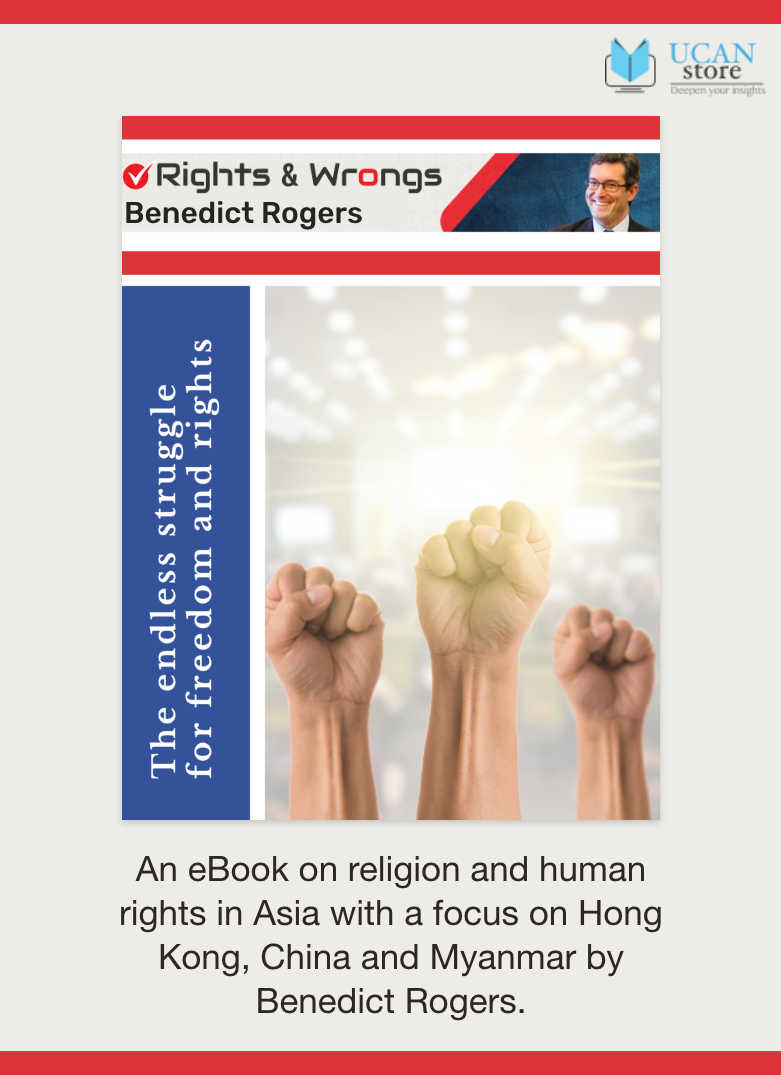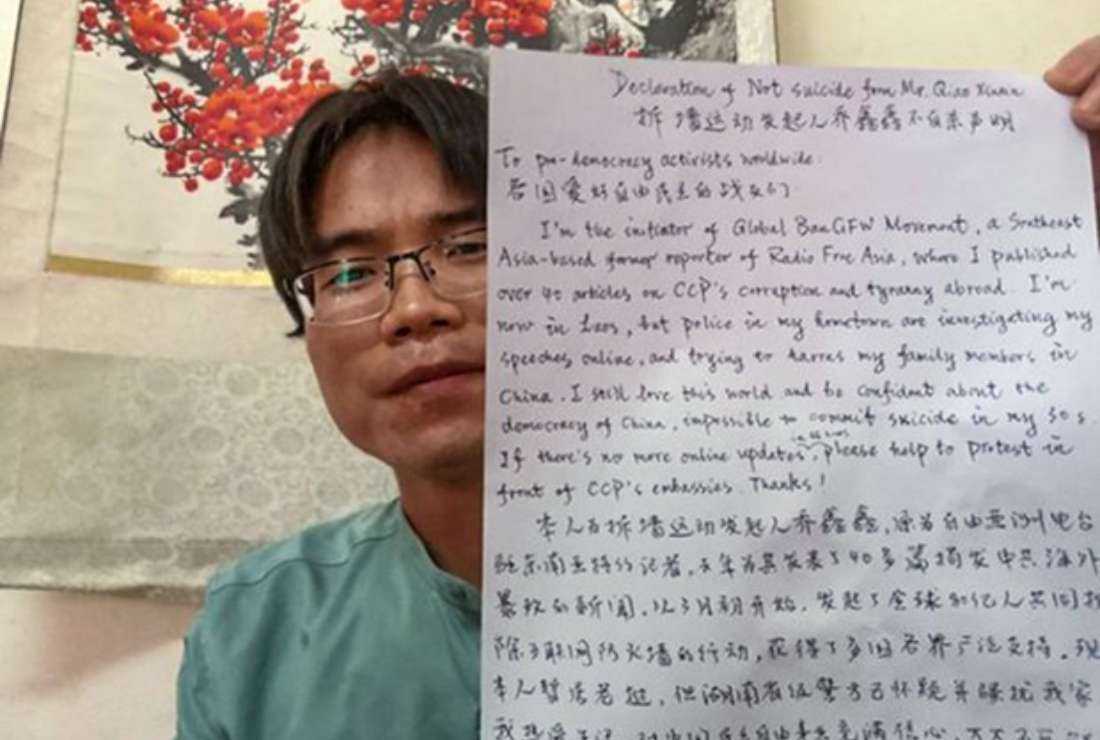
Yang Zewei was secretly arrested on June 1 after he launched a campaign to end censorship in China

Qiao Xinxin, who launched a campaign to end internet censorship in China, known as the BanGFW Movement, holds a statement in an April 20 Twitter post in which he calls on activists to stage protests outside China's embassies around the world should he fail to post to his social media accounts for 48 hours. (Photo: BanGFW Movement)
Rights campaigners have accused China’s communist regime of secretly detaining a dissident free-speech activist from Lao capital Vientiane after he launched an online campaign to end censorship.
Yang Zewei, popularly known as Qiao Xinxin has been reported missing and allegedly detained on or around May 31, Radio Free Asia (RFA) reported on June 13.
His associates have accused the Chinese regime of using used its controversial long-arm jurisdiction to arrest him from Laos.
Yang recently launched the #BanGFW Movement, aimed to mount global pressure on China to bring down the Great Firewall which censors all content on Chinese social media platforms.
Citing Yang’s neighbor in Laos, activist Lin Shengliang living in the Netherlands alleged that Yang was arrested after he returned from a swim in the Mekong River on June 1.
"It's very likely that the people were hiding [in his apartment] and grabbed him as soon as he walked in the door. They likely pressed him to the floor in an instant,” Lin said.
"He would definitely have resisted... but there would have been no time for him to send out any signal for help," Lin further added.
According to Ling, Yang’s neighbors had seen eight police officers taking Yang away in handcuffs. They allege that six of the officers were Chinese.
Lin, who spoke to the local police over the telephone said that they were very eager to avoid any involvement in the case.
"The guy said, 'It's not our case,' and was eager to wash his hands of it. But it was passive confirmation that he was arrested," Lin said.
Yang’s arrest came after he released a statement on Twitter on April 20 calling upon fellow activists to stage protests outside China's embassies around the world against Chinese censorship should he fail to post to his social media accounts for 48 hours.
Yang, in his handwritten statement titled “Declaration of Not Suicide,” alleged that the police in China was investigating his social media posts and putting pressure on his family members as a tactic to bring him home.
"I still love this world and [am] confident about the democracy of China. If there are no more online updates for 48 hours, please help to protest in front of [Chinese] embassies. Thanks!” the statement posted with Yang’s selfie read.
"I am now in Laos, but police in my hometown are investigating my speech online and trying to harass my family members in China," Yang said.
Wang Qingpeng, a member of the activist group China Citizens' Action Party tweeted on June 2 that Yang had been incommunicado for 48 hours following his alleged arrest on June 1.
According to the activist group, Yang launched the #BanGFW movement online in March which drew the ire of the Chinese authorities. The police retaliated to Yang’s activism by targeting his family members in a move to coerce him to return to China.
"Qiao Xinxin [Yang] didn't back down, but fought harder and harder," the online petition author identifying himself as Prince Ye wrote.
"He invited more netizens to raise placards calling for the Great Firewall to be torn down, to contact different governments, and to get in touch with the media,” he further added.
China’s controversial long-arm jurisdiction has been condemned by international rights organizations and some countries have even initiated investigations into its illegal international police posts.
In October 2022, the Canadian federal police-initiated investigations into Chinese police posts in a residential home, a single-story commercial building, and a convenience store in the Toronto area.
The move came after Madrid-based Safeguard Defenders reported last September that around 54 overseas police stations in various countries are run by Beijing.
The rights group’s report had sparked investigations and orders to shut down secretive police stations from governments around the world.
Wang Nan, a fellow free-speech activist pointed out that cross-border law enforcement by Chinese police is common in Laos and Thailand.
"China [is believed to have] arrested people in Thailand more than once. As far as I know, most of Thailand's economy and export trade depends on China, while the same is true in Laos,” Wang told RFA.
Deng Haiyan, a former Guangzhou police officer stated that he was forced to cut off all ties with his China-based family after coming to live in the United States.
"They harassed all of them – my father, even my wife's sister and brother-in-law," Deng told RFA.
"I have basically cut off contact with them now, for fear they will be treated as guilty by association," Deng said.
"They also do certain things online to target me, like posting my personal details like my ID card number and that of my wife on social media, and libeling me, saying I am part of a pornography ring. All of this is ongoing," he added.
Help us keep UCA News independent
The Church in Asia needs objective and independent journalism to speak the truth about the Church and the state.
With a network of professionally qualified journalists and editors across Asia, UCA News is just about meeting that need. But professionalism does not come cheap. We depend on you, our readers, to help maintain our independence and seek that truth.
A small donation of US$2 a month would make a big difference in our quest to achieve our goal.

Share your comments